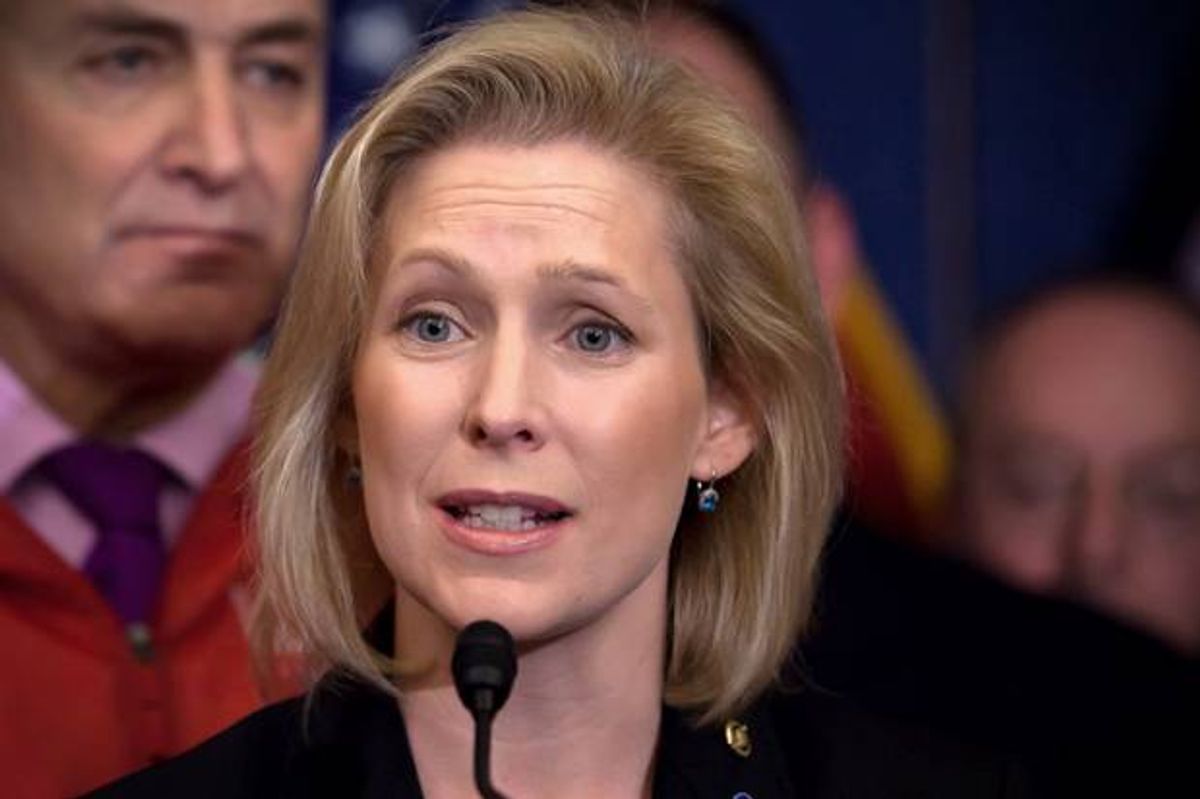You're not allowed, it seems, to write an article about New York Sen. and possible presidential hopeful Kirsten Gillibrand without comparing her to Tracy Flick (Politico yesterday dutifully observed the tradition). Yes, Gillibrand is ambitious, female and blonde and has been said to have sharp elbows -- it's taken less than that to trot out the "Election" protagonist before -- but there may be a more interesting comparison here: Mitt Romney.
When Gillibrand -- a hot topic in political circles this week, as a potential liberal presidential candidate and a champion for addressing sexual assault in the military -- was appointed to Hillary Clinton's Senate seat in 2009, Nate Silver wrote, "This is not a terrific outcome for progressive Democrats," because "Gillibrand, statistically speaking, has been one of the more conservative Democrats in the House. Moreover, she is a somewhat proud conservative, being a member of the Blue Dog caucus. In a state like New York, which is capable of electing and re-electing a very liberal senator, that’s a somewhat underachieving result for the Democrats."
Of course, Silver's model manifestly could only predict the future based on the past, and couldn't anticipate Gillibrand's enthusiastic transformation into an overachieving New York liberal senator. Take the issue of guns: Gillibrand went from having a 100 percent rating from the NRA in her 2008 campaign to this month calling the failure of gun control "one of the most deeply disappointing days of my short time in the U.S. Senate."
On "Meet the Press" before the vote, Gillibrand barely blinked when David Gregory asked her about the switch, reading to her from her 2008 campaign website calling her "an ardent opponent of legislation that will curb the second amendment for responsible gun owners." Gillibrand replied smoothly, "But that's why I know this bill will work, and this compromise will work." She added, "This is not about the NRA. This is about families. This is about America."
It wasn't the first time she was asked about a position switch -- she usually says she was representing a small slice of New York before and is now representing the whole swath -- and it won't be the last. But Mitt Romney would have been proud of that unembarrassed political opportunism. Gillibrand has become famous for championing gay rights, including repealing "don't ask, don't tell" (done) and the Defense of Marriage Act (not yet) but had, according to the New York Observer, "the lowest rating of all of New York's Democratic representatives from the LGBT advocacy group the Human Rights Campaign" when she was appointed to the Senate.
And the former Massachusetts governor who in a primary debate famously quoted himself saying, “I’m running for office, for Pete’s sake, I can’t have illegals," might have laughed awkwardly in recognition at this recollection from Gillibrand's mother in New York magazine: “I remember getting a call from her saying she was having a tough time finding a cleaning woman who wanted to be paid legally. I said, ‘What’s the big deal?’ And she said, ‘Mom, I might want to run for office someday. I can’t have an illegal cleaning my house. I’ll do it myself if I have to.’"
But the Romney analogy will take you only so far. For one thing, there are some positions Gillibrand holds that have remained unchanged, including her support for abortion rights, which has won her the firm support of NARAL since her first run for the House in 2006. (OK, so it's a short list). And most important, Gillibrand has exercised real leadership in the Senate on issues that matter both nationally and to her constituency -- like the aforementioned advocacy on "don't ask, don't tell," cleaning up military culture, and health protections for ground zero workers -- something Romney never had either the inclination or the chance to do. Richard Socarides told Politico of Gillibrand, “She’s rather fearless. She’s not risk-averse, like most people in politics.” Having staked out her new territory, she's pursued it with startling effectiveness -- good news, at least, for people who tend to agree with her.
While certain gay rights issues have enjoyed a new groundswell of support, some of the issues Gillibrand has embraced are a more uphill climb. Encouraging and recruiting more women to run for office may double as politically expedient, seeding allies while creating maximally magnanimous optics, and it also seems to have gotten Gillibrand an extra dinner with the president along with the other female senators. But as far as I'm concerned, the valuable ends justify the intentions, and so far we've been celebrating at getting to 20 percent of the Senate -- not exactly a place to turn away allies who want to do the work. That's even more true for the narrow expansions of abortion rights that are currently feasible at the federal level.
As the New York Times highlights in an editorial today, Gillibrand has introduced two bills on behalf of women in the military, one that would allow women to get abortions in military medical facilities if they used their own money (this counts for an achievement in today's climate) and another that would reform the response to military sexual assault.
So she's an able champion, if not a firmly principled one. In other words, a good politician. Which is just fine, as long as her constituents don't mistake her for anything else.



Shares